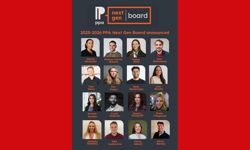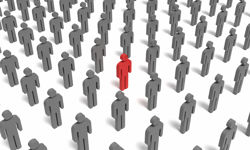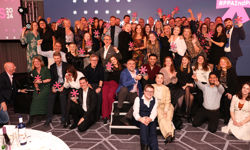
A young James King was driving home from work one day in 1989 when he had a eureka moment. It was the dawn of the single market; he was advertising manager of an international magazine and his big construction clients were telling him they had nowhere to promote their pan-European image. Existing titles catering to the sector were focused on their domestic markets and the threat posed by the European Union. “I hit the steering wheel of the car and said, we’re going to launch a magazine called Construction Europe.”
Rapid growth
Filled with what he now admits was naïve enthusiasm, he found a government-supported scheme for entrepreneurs with ideas but no capital, a bank underwrote his business plan and KHL was launched on 7 December “around teatime”. KHL stands for King Haller Limited as King’s launch partner was Hans Haller, the German sales agent for the company he was working for at the time, who has since exited the business.
Thirty-four years later, KHL is a leading media brand for the global construction industry with offices in the US, China, India, and Germany and 111 employees around the world.
In 1992, a Dutch businessman called Tony Kenter invested a considerable amount of money in the business which gave them the oxygen to thrive. Another key figure was Paul Marsden who joined as an editor and became a shareholding director in 1990, becoming an important influence on the company until his departure a few years ago.
Today, the group is a diversified media business with sixteen magazines covering the construction industry and, more recently, the global power industry with the acquisition in 2018 of the Diesel Progress Group. In 2017, KHL acquired Off-Highway Research, a market intelligence arm. In addition, the group has expanded into recruitment, training and exhibitions and events. In 1996, it launched its first exhibition in Maastricht, Apex, aimed at the aerial platform industry. In 2014, it added Apex Asia in Shanghai, in partnership with the world’s biggest exhibition organiser, Deutsche Messe.

“From the exhibitions, we launched an events division that has conferences and awards dinners as well. We try and do the Oscars for each sector of the construction industry, from Shanghai to Berlin to Chicago, Miami, Vienna, and London.”
The group’s most recent innovation is the launch of a global daily newsletter, Construction Briefing, which already has 37,000 subscribers when we speak three weeks after its launch, with a potential audience of hundreds of thousands.
King explains that KHL was an early digital adopter, managing to bag the website URL khl.com at the start of the 1990s, much to the annoyance of Russia’s largest ice hockey league (Kontinental Hockey League) who have since tried to buy it off them.
Although they started off as a straightforward magazine publishing business, they were one of the first to launch digital editions in 2001 and have them audited by the BPA.
He believes print and digital are complementary. Print now accounts for around 35% of the group’s revenue, down from 70-75% a decade ago. But their target audience of senior management of large construction companies who receive copies under a controlled circulation model still like to consume print among other forms.
Brand-focused
But the group is at a moment of change. Where once the print magazines were the hub, the brand is now at the centre, and print is just one of the spokes, alongside websites, newsletters, conferences, award dinners, data, and research.
“Very soon, we will not be selling print, or newsletters, or website banners, or data; we’ll be selling an audience,” says King.
They are already in discussions with their major clients, the big global suppliers of construction equipment, who will be able to pinpoint the territories and demographics they want to target. “We’ll be able to deliver that with a guaranteed return on investment,” King promises.
The game changer has been investment in a customer data platform which allows the group to track its audience on all its channels, including behavioural data, and detailed demographic information.
“We’ll be building up this profile of our readers, of what magazines they subscribe to, what conferences they attend, what data services they buy from us, what newsletters they subscribe to, then we’ll be selling that attention back to our clients. That’s exciting for us. Nobody’s doing that on a global basis in our sector,” says King.
Around the year 2000, KHL realised that China was becoming a major player in the global construction industry. King and his team jumped on a plane, flew out to China to meet potential joint venture partners, and ended up setting up two offices in Beijing. China is now their biggest market after the US, followed by Germany, Scandinavia, the UK, France, Italy, and Spain.
Premium content
One of those Beijing offices is dedicated to Off-Highway Research, which also has an office in New Delhi. Formed in 1981 as part of The Economist Intelligence Unit, it is a management consultancy specialising in international construction and agricultural equipment. King explains the acquisition has been a real growth driver for KHL both in terms of revenue and profits. It has strengthened their media offering by providing proprietary information that no one else has access to, allowing them to map and monitor trends in global markets by product type.
“It’s a lot more profitable than publishing magazines. It has also provided us with collateral benefits, such as it allows us to map markets to target our circulation of the old-fashioned print products. The sell to our advertisers is, ‘We know where your markets are, we know who’s buying, when they’re buying it, what type of equipment they’re buying,’ and we apply that to our circulation strategy.”
They have even launched an Off-Highway Research conference in Las Vegas, attended by banks, analysts, and the marketing directors of their major clients, adding credibility to the company.
Subscriptions to this data and research arm of the business now accounts for around 15% of revenue, which has made King look again at the possibility of introducing paid subscription for premium editorial, which at present is free under controlled circulation.
“I see us moving towards that. We’re not currently selling a subscription to our content on the websites or newsletters. We still see ourselves as a marketing services company, so the revenue is driven by selling marketing services, but the high-quality content is creating the engagement with our clients’ customers and then we’re selling that engagement,” King explains.
He hopes that in the future, subscription revenue can act as a buffer during any downturns.
“Our paid-for content is very valuable. Covid increased our subscription revenue for Off-Highway Research because people needed more clarity. They needed the information to help them through the tough times, whereas marketing services got hit. When people are not confident, they don’t spend money on advertising. Subscription revenue is higher quality, and you don’t lose it during a downturn.”
Because of the nature of the sectors they cover, KHL is particularly impacted by global political events. King says: “Geopolitical events are our biggest challenge. War in Europe, high interest rates, people don’t have the confidence to borrow so much, and a lot of infrastructure is based on borrowing money. The extended Chinese Covid lockdown had a massive downward impact on us. Not just because of Chinese revenue, but because our clients rely on the supply chain of Chinese components. This is one of the reasons why America is so important for us, because their economy has come through Covid and done extremely well.”
The future
The hope now is to attract hundreds of thousands of new readers, then build up a picture of them to sell back to their clients. While board directors of Fortune 500 companies in each of their sectors are their “low-hanging fruit”, they are also looking to tap into the expansion and investment in medium sized companies in fast-developing economies such as Singapore, Vietnam, Cambodia and Laos. New technology will enable them to offer information in their own language to smaller, family-run companies in countries such as France, Germany, Spain, and Italy. KHL was already the first to publish a pan-Latin American construction magazine in both Spanish and Portuguese. They have retrained editors to be SEO-friendly and to amplify the content they produce using every social media channel available, from LinkedIn to TikTok. Editors are also being offered a financial incentive to increase engagement rates.
“Construction next to finance is probably the biggest industry in the world, so we have a potential audience of hundreds of thousands of readers. Because of the constraint of costs of producing print magazines for a global market, it’s always held us back. We just focused on the quality of the circulation rather than the quantity. I think we do both now,” says King.
He sees AI as an opportunity, enabling content creation with human input as the “magic dust”. Their competitors today are new, smaller digital players who see what they are doing and want a part of it.
“We welcome that competition because it keeps us honest and keeps us innovating and investing. What we have is huge loyalty and trust from our readers and our advertisers. Whatever a competitor does, they have to start from scratch.”
They are also just about to launch a content studio in both the UK and the US to produce thought leadership pieces, white papers, and webinars on behalf of clients.
“A lot of our clients don’t have the capacity to produce that or get a PR company to do it who don’t fully understand the industry. Everybody thinks they’re publishers, but we are actually publishers.”
He adds: “It's an interesting journey that I’m not sure will happen again. I started the business in my two up two down cottage in Lamberhurst, Kent, in 1989. We’re now the dominant media player in this industry around the world.”
This article was first published in InPublishing magazine. If you would like to be added to the free mailing list to receive the magazine, please register here.










